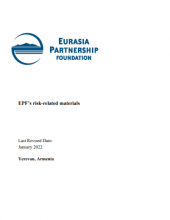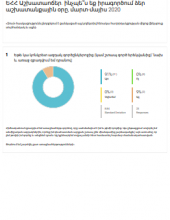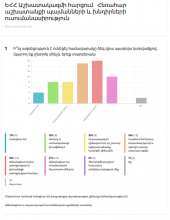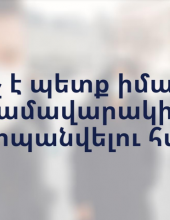Major internal (corruption-related, financial etc.) and external risks and the ways to respond to them are reflected primarily in EPF’s Policies and Procedures, as well as in the documents accompanying P&P. In addition, EPF has general and specific risk-related documents (policies), and develops risk matrixes for every particular project; including estimates of their likelihood and ways to minimize their impact. However, events starting from 2020 such as the COVID-19 pandemic and the war, as well as the uncertainty accompanying them and continued in their aftermath, deeply changed the place of risks in Armenian society and, accordingly, affected EPF’s practice. In fact, even before the pandemic, big companies and academics globally already understood that the problem is not foreseen risks, but unexpected risks which are impossible to predict. EPF too, while always considering the possibility of a war with Azerbaijan - because of the unresolved conflict - did not ever imagine that a global pandemic may affect the world and its operations. Moreover, the combination of pandemic and war together created a unique situation of risks which were atypical not only for the entire previous period of EPF’s operation and Armenia in general, but also for the region as a whole.
What should a company do to offset unexpected and unpredictable risks? Number one: carry on being aware of and ready to respond to the expected risks since their occurrences may well compound the unexpected risks. Number two: ensure a robust operational system and management reaction capacities are in place which allow for an early response and flexible defense against unexpected risks. Number three: design programs specifically with an eye on the possibility of unexpected risks. Number four: implement practice in such a dynamic way that allows for daily, if not hourly, changes in order to respond to unexpected risks in the most effective way possible with the least losses; be they operational, resource-related, psychological, or other. Number five: continue studying the global thinking on these issues and learn from it what else can be done to mitigate and avoid negative impact.
The years 2020 and 2021 proved that EPF is fully managing four out of the above five points, and needs only to enhance its knowledge on global thinking related to these issues (it is also important to mention that the world was also taken by surprise and caught unprepared when the pandemic started, and the discussion around unexpected risks is a global novelty). In addition, as a leadership company, EPF was put in a position and felt an obligation to provide advice and support to its many partners, grantees and beneficiaries, who were in a less robust condition compared to EPF. EPF is thankful to its donors whose support was invaluable to achieve the outcome of almost no losses during the long-term crisis. The crisis is not over however, and the condition of living and operating in an environment prone to unexpected risks continues, making it crucial for EPF to stay alert and flexible. Lessons learned from the crisis of 2020-21 have to be collected and analyzed too. For instance, the possibility of war has always been in the risk matrix, however, the magnitude of it and other details, including outcomes, could not have been predicted and were unexpected. This means that even expected risks, when they happen, can become ‘unexpected’ because of their particular qualities. In this situation the robustness of the organization’s operational systems, as well as having factored in the possibility of unexpected risks become crucial components of a successful response. Examples include keeping the operations flexible in such a way as to change, if needed, their timing, place, or on-line/off-line nature, etc. Likewise having enough resources to react in a timely way to the newly appearing needs (e.g. psychological assistance). EPF had many systems in place which helped respond to the risks; including excellent financial operations, psychological assistance, IT security, and emergency plans, etc. Its donors were also very flexible, supporting the need to change the projects’ details without sacrificing their main aims. In addition, for many years EPF has been learning to notice and take into account the unexpected positive outcomes of its projects and build new action plans and even strategies capitalizing on them. This openness to the unexpected has been another source for a relatively successful responses to the situations in 2020-21.
Many responses to the crisis are reflected in the documents below, and they are themselves a source of learning, analysis and change to be better prepared for the future. EPF continues attentively studying the evolving situation and learning how to best predict the risks and plan their mitigation strategies, control them and respond to them, capitalizing also on advice from its auditors and partners.
EPF Working from Home Work Style Survey Results
Brief Information on preventive measures for COVID-19
Please, see also related other policy pages: EPF Anti-Corruption Policies ; EPF Policies on Sexual Exploitation and Abuse ; EPF IT Policy




